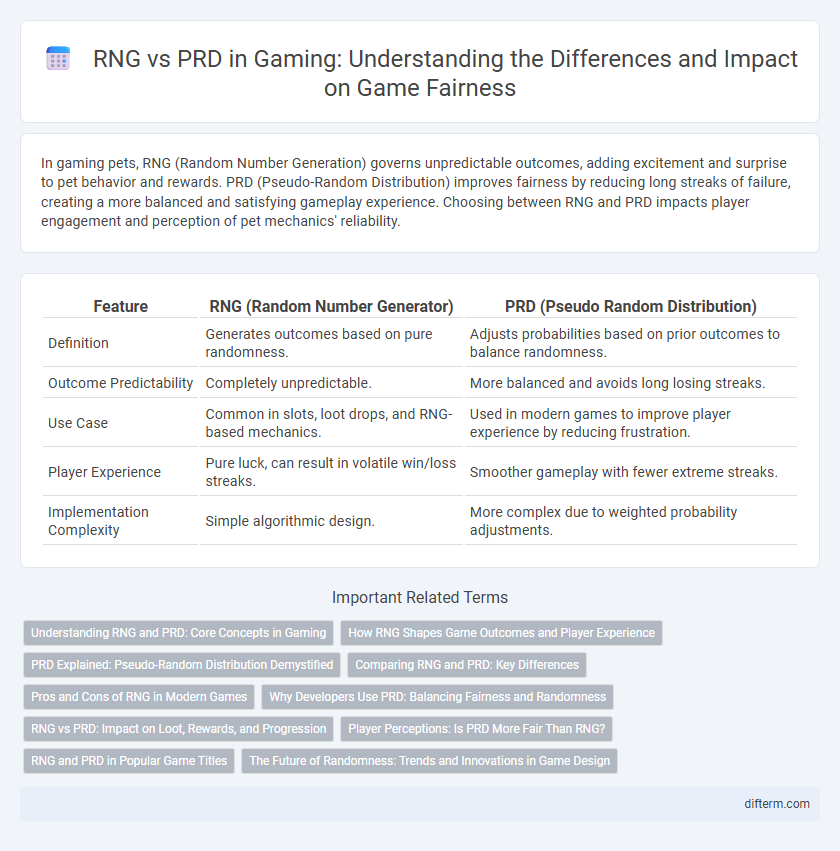In gaming pets, RNG (Random Number Generation) governs unpredictable outcomes, adding excitement and surprise to pet behavior and rewards. PRD (Pseudo-Random Distribution) improves fairness by reducing long streaks of failure, creating a more balanced and satisfying gameplay experience. Choosing between RNG and PRD impacts player engagement and perception of pet mechanics' reliability.
Table of Comparison
| Feature | RNG (Random Number Generator) | PRD (Pseudo Random Distribution) |
|---|---|---|
| Definition | Generates outcomes based on pure randomness. | Adjusts probabilities based on prior outcomes to balance randomness. |
| Outcome Predictability | Completely unpredictable. | More balanced and avoids long losing streaks. |
| Use Case | Common in slots, loot drops, and RNG-based mechanics. | Used in modern games to improve player experience by reducing frustration. |
| Player Experience | Pure luck, can result in volatile win/loss streaks. | Smoother gameplay with fewer extreme streaks. |
| Implementation Complexity | Simple algorithmic design. | More complex due to weighted probability adjustments. |
Understanding RNG and PRD: Core Concepts in Gaming
Random Number Generation (RNG) in gaming refers to algorithms that produce unpredictable outcomes, ensuring fairness and variability in gameplay. Pseudo-Random Distribution (PRD) modifies RNG by controlling the probability of certain results over time, reducing streaks and creating a more balanced player experience. Understanding these systems helps developers design games that maintain player engagement through perceived fairness and dynamic challenge adjustments.
How RNG Shapes Game Outcomes and Player Experience
Random Number Generators (RNG) play a crucial role in shaping game outcomes by introducing unpredictability and variety, ensuring each playthrough remains unique and challenging. By generating statistically random outcomes, RNG maintains fairness and suspense, impacting player engagement and satisfaction across genres such as RPGs, loot-based shooters, and card games. Unlike PRD (Pseudo-Random Distribution), which controls outcome frequencies for balance, RNG provides true randomness, creating an immersive experience driven by chance and skill.
PRD Explained: Pseudo-Random Distribution Demystified
Pseudo-Random Distribution (PRD) optimizes game mechanics by minimizing long streaks of bad luck common in pure Random Number Generation (RNG). PRD uses mathematical formulas to adjust event probabilities dynamically, ensuring a more balanced and predictable experience for players. This system improves player satisfaction by reducing frustration caused by extended unlucky sequences in games.
Comparing RNG and PRD: Key Differences
RNG (Random Number Generator) relies on pure randomness to determine game outcomes, creating unpredictable and evenly distributed results. PRD (Pseudo-Random Distribution) adjusts probabilities dynamically to reduce long streaks of failure, enhancing player experience by balancing fairness and variance. Key differences lie in RNG's true randomness versus PRD's engineered probability smoothing, impacting game fairness and player retention strategies.
Pros and Cons of RNG in Modern Games
Random Number Generation (RNG) in modern games offers unpredictability, creating dynamic and replayable experiences by ensuring each playthrough feels unique. However, RNG can lead to frustration due to perceived unfairness or luck-based outcomes that diminish player skill impact. Despite these drawbacks, RNG remains crucial for game mechanics like loot drops, procedural generation, and critical hit chances, balancing excitement with randomness.
Why Developers Use PRD: Balancing Fairness and Randomness
Developers use Pseudo-Random Distribution (PRD) to balance fairness and randomness by reducing the perception of unfair streaks common in traditional Random Number Generator (RNG) systems. PRD algorithms adjust probabilities dynamically, ensuring players experience more consistent outcomes without sacrificing unpredictability. This approach enhances player engagement and satisfaction by delivering a fairer gaming experience while maintaining the excitement of chance.
RNG vs PRD: Impact on Loot, Rewards, and Progression
RNG (Random Number Generation) introduces unpredictable variability in loot drops, often leading to frustrating gameplay due to inconsistent reward distribution. PRD (Pseudo-Random Distribution) mitigates this by increasing the probability of rare item drops over time, ensuring a more balanced and fair reward system. This approach enhances player progression by reducing the luck factor and promoting sustained engagement through transparent and equitable loot mechanics.
Player Perceptions: Is PRD More Fair Than RNG?
Player perceptions often favor Pseudo-Random Distribution (PRD) over traditional Random Number Generation (RNG) due to PRD's ability to reduce streaks of bad luck, creating a sense of fairness and predictability. Studies reveal gamers feel PRD enhances game balance by ensuring more consistent reward intervals, which contrasts with RNG's inherently unpredictable nature that can lead to frustration. The psychological impact of perceived fairness in PRD systems contributes to higher player satisfaction and retention.
RNG and PRD in Popular Game Titles
Random Number Generator (RNG) and Pseudo-Random Distribution (PRD) both play crucial roles in game mechanics, influencing player experience through randomness and probability. Popular game titles like World of Warcraft use RNG for loot drops, creating unpredictable outcomes that enhance replayability, while games like League of Legends implement PRD to smooth out chance-based events such as critical strikes, reducing frustration from streaky results. Balancing RNG and PRD in these games helps developers maintain fairness and engagement, ensuring gameplay remains exciting without feeling unfair or overly random.
The Future of Randomness: Trends and Innovations in Game Design
The future of randomness in game design is shifting from traditional RNG (Random Number Generation) to PRD (Pseudo-Random Distribution) systems, enhancing player experience through more balanced and fair outcomes. Innovations in PRD algorithms reduce streak variance, preventing frustration by ensuring a more predictable but still uncertain distribution of events. Emerging trends emphasize adaptive randomness that dynamically adjusts difficulty and rewards based on player behavior, driving deeper engagement and satisfaction.
RNG vs PRD Infographic

 difterm.com
difterm.com